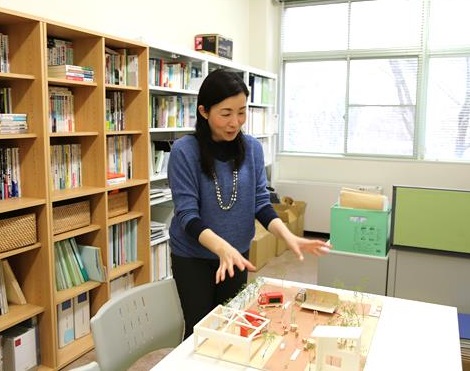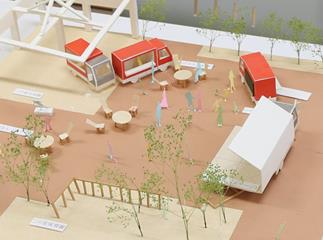TSUKUBA FUTURE
#058 Creating Communities with Vibrant Living for All
Associate Professor FUJII Sayaka, Faculty of Engineering, Information and Systems

Many local governments and communities are engaged in community development. Although everyone shares the desire to make the place they live more comfortable and appealing, the ideal lifestyle or environment varies from person to person, even among those living in the same community. Prof. Sayaka Fujii provides support for discussion and project planning by people in a community—in order to develop communities where everyone can live happily, while resolving community issues with an eye to the future.
"Community development." It's a term we often hear these days. In practice, there are a wide variety of goals and methods for community development—ranging from community redevelopment or revitalization of industry to voluntary activities by residents. Prof. Fujii's specialty is community development focused on community resources such as buildings and landscaping. Her research is not limited to new development; she also examines new roles for old buildings, and the renovations required to fulfill those roles. As basic research, she carries out comparative surveys, visiting numerous communities both in Japan and abroad, and investigating actual examples of community development. In terms of practical research, she is often consulted by local governments. After investigating the unique characteristics and challenges facing a community, she works with the local people to create a community development plan and system.

Ordinarily, community revitalization projects are managed by local governments or land/building owners. However, changes in the way buildings or land are used have a significant impact on the surrounding environment. Therefore such projects cannot be carried out while ignoring the local residents. The process of resident participation is a vital part of community development. A plan suited to the community must be developed—respecting the opinions of residents with their various perspectives and ideas; incorporating the ideas of government, industry, locally active organizations, supporters outside the community, and other involved parties; and taking into account how people will live 10 or 20 years in the future. To accomplish these aims, it is essential to involve experts (facilitators) with an objective perspective who can bring an entire project together. Prof. Fujii often assumes that role when requested by local governments and communities.

Joso City, Ibaraki Prefecture is a case in point. The city was severely damaged by flooding in 2015, and several research groups at the University of Tsukuba have supported the reconstruction efforts. Within the Faculty of Engineering, Information and Systems, the Division of Policy and Planning Sciences to which Prof. Fujii is attached provided across-the-board support for formulation of reconstruction plans. Large numbers of people continue to live in evacuation shelters, and have a wide variety of needs including the desire to return home as soon as possible, the hope that this opportunity will be used to improve the living environment and boost disaster preparedness, and the desire for monetary support. However, it is not possible to meet all of these needs at the same time. The Reconstruction Vision Review Committee and the Reconstruction Development Planning Committee have each met on three occasions, and a consensus was gradually reached by discussing priorities, and sharing information on the current situation and ongoing problems. The reconstruction plan developed in this way was formally decided through a process of public comment.
These discussions are a key process of community development. However, sometimes workshops involving the public do not result in proposals being realized. This is due to weak legal mechanisms for incorporating ideas of the citizenry into administrative policy. Even so, there are many examples of community involvement leading to successful community revitalization, such as the rejuvenation of traditional shopping districts and support for mothers raising children. Such activities provide a way for members of the community to utilize each other's expertise and create a venue for meaningful social involvement. Another side of community development is that it provides encouragement to people and creates a framework for more enjoyable living.
Prof. Fujii came to Tsukuba Science City when she was a child. At first, she says, Tsukuba didn't feel like home to her, but she gradually became interested in Tsukuba's varied scenery and environments of manmade areas coexisting with old farmlands. When she herself began raising her children, she realized how convenient life in Tsukuba actually was. Today, she is proud of being from Tsukuba. However, despite the careful planning which went into creating Tsukuba, more than 40 years have passed and a lot of maintenance is needed, due to changes such as discontinued public employee housing and community dispersion. Prof. Fujii has observed firsthand Tsukuba's changes over the years, and is now working with the local government and members of the community to find the best approach for Tsukuba in the future.
A large number of homes were built at once throughout Japan in the 1960s and 1970s. However, floor plans and facilities, state-of-the-art at the time, have gradually become dated and inconvenient. Changes over time in resident demographics, community size, and other factors have brought with them a variety of issues. Efforts to resolve the different issues facing each community were the starting point of community development. Changing the living space, and creating new programs for people living in an area to join together and nurture their community... By combining those two approaches, Prof. Fujii wants to enrich the lives of people in the community. Although this is a field of research without a clear-cut goal, where results are often difficult to ascertain, the power of community development is definitely growing.
Article by Science Communicator at the Office of Public Relations


